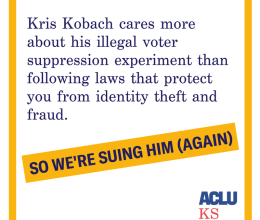
FOR IMMEDIATE RELEASE
December 10, 2019
CONTACT: Mark McCormick, Director of Strategic Communications, 913-490-4113, [email protected]
OVERLAND PARK, KS - The ACLU of Kansas has reached a settlement in its 2018 “Crosscheck” lawsuit filed against the flawed data comparison program that mistakenly exposed the sensitive, personal information of nearly 1,000 Kansas voters.
The settlement includes a list of information safeguards before the program can resume as well as an “acknowledgment of error” statement from Kansas Secretary of State Scott Schwab’s office reading:
“The Kansas Secretary of State's Office acknowledges your personal information was improperly disclosed through the Interstate Voter Registration Crosscheck Program. We recognize this led to an error in the use and handling of your information. Our office has adopted policies and procedures to ensure your voter information will be protected in the future.”
Nadine Johnson, Executive Director of the ACLU of Kansas, commended Secretary Schwab for his work reaching the settlement.
“This is a victory not only for our clients, but for every Kansas voter,” Johnson said. “We’re pleased to see Secretary Schwab’s willingness to address this issue and to ensure the protection of voters’ personal data.”
Lauren Bonds, Legal Director for the ACLU of Kansas and who filed the June 2018 lawsuit with co-counsel Dentons LLP, said Secretary Schwab has committed to overhauling Crosscheck.
“We realize it will take no shortage of time and resources to get the program up to code,” Bonds said. “In the meantime, we hope Kansas will continue to explore more secure and accurate alternative programs to identify double registrants."
Former Secretary of State Kris Kobach, also named in the suit, championed Crosscheck as a way to identify matching voter registration information among participating states. It proved problematic, however, as studies showed it produced false positives more than 99 percent of the time. Dozens of participating states eventually left Crosscheck for better list maintenance programs.
As a part of the settlement, Schwab has agreed not to resume operating Crosscheck until all security upgrades recommended by the Department of Homeland Security have been implemented, industry-standard encryption practices are adopted, and participant states agree to a penalty of expulsion from the program for any negligent, reckless or intentional disclosure of information.
Plaintiffs Scott Moore, James Long, and Nancy Perry brought this action. They argued that the reckless maintenance and disclosure of their private voter data represented an unconstitutional invasion of privacy and a violation of the Kansas Public Records Act, which prohibits government disclosure of Social Security numbers.